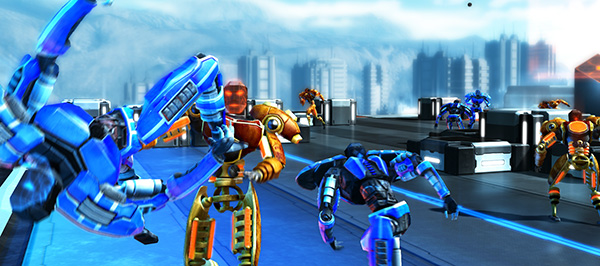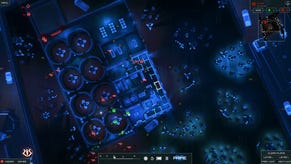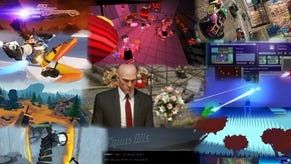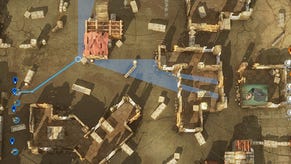Frozen Endzone's Influences, Singleplayer & Unsportiness
In the Frendzone with Mode 7
As well as pointing my tragically non-robotic eyes at robot futuresports / strategy game Frozen Endzone last week, I also had a long natter with Mode 7 founders Ian Hardingham and Paul Taylor about their follow-up to the splendid Frozen Synapse. Read on for its origin story, how it's not really like American Football, their roguelike-like plans for the game's singleplayer mode, inevitable comparisons to Blood Bowl and Speedball, and Luigi fanfic.
RPS: How did Frozen Endzone come about?
Ian Hardingham: Basically, towards the end of Frozen Synapse, the point where you don't get to do anything creatively on the game anymore like adding new features, I started getting really into what we're going to do next, designing stuff on paper as a slight creative outlet. That was when I targeted this as what I wanted to do next. I felt like Frozen Synapse, really popular, I really liked it, simultaneous turn-based, generative stuff, all this stuff that people know about Frozen Synapse - I wanted to do that again, and I wanted to react to something that I wanted to see differently from it.
I think Frozen Synapse requires a lot of concentration, a lot of time, and I wanted to make something that was a little bit more freeform. More creative, but didn't punish you so badly for not having your complete concentrated hat on all the time. I love the aesthetics of American Football and I love futuresports, and I don't think we've had a really cool futuresport recently.
So I wanted to get across the feel of what I feel when I'm watching NFL, in terms of aesthetics, and I wanted to have robots in the future and crap like that.
RPS: There's two of you heading up the studio, how mutual was the idea this time?
Paul Taylor: It was all Ian. Ian's the designer and my major creative roles are music, writing and some art direction, and then some general singleplayerish stuff that doesn't' really make sense. And also I'm Ian's sounding board for stuff in general. That's how it works with us, and the good thing about working with Ian is that he's never had a serious idea that I've disliked. He's had some stupid ideas that I've disliked, but whenever he's come up with 'look, I seriously want to make this' it's always initially been 'and I want to make it too, I just hadn't realised it yet.' So we kind of plug in together very well.
I think if this was a company with two game designers in it, that would be massively difficult, and it probably wouldn't work.
Ian Hardingham: Yeah, we are complete partners, both Mode 7, but we have really defined roles as well. We talk about pretty much everything, and almost always we agree in the end. But there are areas where I would have the final veto, and Paul would have the final veto. Certainly, the core design comes from me and then we both work through it, and he has more control of the aesthetic and certain stuff that goes beyond that. Paul was very much the driving force behind the Frozen Synapse singleplayer - the plot and the progression.
Paul Taylor: I tend to look at how Ian's design will interface with all the other things, like the aesthetic and stuff. I really like working this way, and when I see a lone indie developer I always feel massively sorry for them. I also handle a lot of the business side of stuff, and not only being able to take that stuff away so Ian can concentrate on game design, equally if you get isolated and you don't know how some of your mechanical decisions are working and so on... I think that can be tremendously difficult.
Ian Hardingham: Whenever either of us is stuck with a mental block about anything we'll just talk about, go to the pub or something. The amount of time that we feel overwhelmed and there's two of us, then you think about someone like the Retro City Rampage guy doing all of the business side, all of the porting, and I just can't even imagine how he manages it.
RPS: Tell me about the role of Black College Football Xperience in this game. [There's been a huge poster of this, uh, cult classic game in the Mode 7 office for several years.]
Ian Hardingham: [laughs] Black College Football Xperience is a very important game that not enough people have heard of. It's an Unreal 3 game that was basically like a local government product. They had this great Making Of DVD which was significantly more entertaining than the game itself. You really want to get hold of that. We tried to play it, but... it has this really weird dancing minigame at half-time, which is as important as the game itself, because the band and the dancing is very important for the Southern football experience.
Paul Taylor: We're not going to have robot cheerleaders, but maybe we will have a robot national anthem which plays at the national anthem. I'm not sure what that's going to be, but I'm looking forward to writing it.
Ian Hardingham: We could just have them sing the Latvian one. A chiptune version.
RPS: How do you feel about the strong likelihood that people will immediately mention Speedball 2 and Blood Bowl when they see your game? Not that they're particularly similar games, but as you say there aren't many futuresports games these days.
Paul Taylor: People always immediately say something. With Frozen Synapse it was Robosport or Lasersquad. Those associations are just good, because they tend to be classic, fondly-remembered games. I think if you really like Blood Bowl there's probably a good chance you'll like this game as well, even though it's quite different. That's not really something that bothers me, it's just kind of par for the course for any game that has any reference to anything else.
Ian Hardingham: I feel like the gameplay is clearly different enough that people will not even accuse of it of being a clone. That would really upset me, if I made a game and someone was like "oh, that's just like League of Legends but with robots."
Paul Taylor: You know that's going to happen.
Ian Hardingham: [Laughs] Yes, but I think the majority of right-thinking people will not.
RPS: Right-thinking people? We are talking about internet here.
Ian Hardingham: Alright, fine.
Paul Taylor: I think the important thing is that if it isn't a clone, it doesn't matter what YouTube viewers say. I also think it looks different enough, and Speedball is almost the opposite genre. I think it's far enough away, but all those associations are good - Speedball 2 is one of my favourite games anyway.
Ian Hardingham: I'm more worried about English people saying 'oh, American Football is too complicated so I feel like this game is going to be complicated' when it's just not any kind of simulation of American Football and it's not particularly complicated. That's the initial impression that I'm more worried about from people from the UK who loved FS, saying 'oh, this isn't for me because I don't know anything about American Football.' That would be bad for us.
Paul Taylor: I tend to think about the market more than Ian does, because he's more creative, but I thought this was a real case of make what you want to make. If you really love an idea, you should be able to convey what's cool about it anyway, even if people have some prejudice that's against it. I really believed in that, and I was so excited by the initial idea personally that I just thought I'd be so motivated working on it that I wouldn't care if anyone was [puts on mock whiny voice] 'American Football, it's not real sport because...'
Ian Hardingham: And everyone told us when we were making Frozen Synapse that a strategy game for the PC was a completely stupid thing to do.
Paul Taylor: Or that you can't make a turn-based game or whatever. It's not really about that initially, it's just about doing it and all those problems get solved if it's good enough.
RPS: It's true that when you sent me the screenshot and told me about it, my initial reaction was 'uh-oh, I don't really care about sports generally, let alone American Football, do I need to find another journalist to attend this?' But when you showed it me, I was 'oh, OK, I think I can see how this works and I'm pretty sure I could play it.'
Ian Hardingham: Do you think the trailer will assuage people's fears like that?
RPS: The trailer suggested to me more complicated interactions, like you'd have to set up very specific actions to do a tackle or something, but that isn't the case in the game.
Ian Hardingham: OK. I feel like we've got a lot of time now to see how people do respond, and the thing about doing open beta is that gives us a lot of opportunity to respond better.
Paul Taylor: It's interesting that you said that, because tackling's going to be a conscious action, but it's like shooting in FS. Shooting was automatic in FS, a lot of people forget that. It will feel like you're telling them to tackle even though you're not pressing a button to get them to do it, that's the idea behind the interface. Because you know that it's obvious that you would be telling them do it then, you don't need to have an interface that's like "do big tackle now." That's kind of important to Ian's design.
Ian Hardingham: And there's the emergence that happens when you're not a making specific action, and unexpected things happen. That's a lot of the simultaneous turn-based thing, making orders and them not turning out how you expected.
RPS: What can you reveal about singleplayer at this stage?
Paul Taylor: We know certain things about it. We know that we don't want to do a linear campaign style thing, and I know that we don't want to do an infinite tournament or indefinite league thing.
Ian Hardingham: For me, the strongest thing is that I want it to feel in some ways like... Well, when I start a new game of Spelunky. I want to start a new league and get through it in like 25 minutes, half an hour and really feel like I can achieve something new as a player even on my hundredth try. So it's not like when you spend three weeks on your FIFA campaign , building up this massive thing. Here you have these quicker things happen.
RPS: So like FTL, you might not even make it to the mothership and even if you do you might not beat it.
Ian Hardingham: Absolutely, the roguelike thing. A little bit less randomised than FTL, because you got a lot of events completely out of your control, which is all part of the idea and everything, but I'd hope a lot of the emergent stuff that happens is because of things you weren't expecting to happen on the pitch, as well as stuff in between.
Paul Taylor: Less deadly space bingo, yeah. I know some story stuff about singleplayer, because I 'm going to have to write a story that fits within a sort of roguelikey, FTL structure, which will be interesting.
RPS: Sports drama, eh?
Paul Taylor: Yeah, definitely. I want the player character to be a character this time, I didn't really do that with Frozen Synapse. This one I want to be more a roleplaying defined kind of thing, and there's going to be lots of rivalries between teams, rival coaches... A lot of the reason that sports in general is good and fans get into it is because you get a lot of these secondary stories like players going out and getting drunk, then doing something weird, then you get to see them play next week. We want to have some of that out there. I don't know if we're going to have robots going out and getting drunk...
RPS: Or sleeping with some other robot's wife. You've got to get Robot John Terry in there.
Ian Hardingham: [laughs] Yeah, definitely affairs.
Paul Taylor: Anything's possible. I think FS was a bit incredibly po-faced and then I have to lighten it with the odd gag, but this I want to be more straight-up entertaining, more fun, less pretentious maybe. The idea of trying to do an intelligent in this kind of context would be silly in its own right.
RPS: The epic tale of a robot throwing a ball.
Paul Taylor: Right, right, that really amuses me.
Ian Hardingham: We want to have antagonist conversations with the opposing coach, and we'd quite like to have the AI taunting you while you're doing your plans. I used to play Mario Kart a lot when I was younger, and I used to come up with these incredibly detailed storylines about what Luigi was like as a person [everyone in the room laughs uproariously here].
RPS: You mean you wrote Luigi fanfic?
Ian Hardingham: I just hated these characters terrifically, because they were always beating me. The same is true of Alpha Centauri - I feel like I really know the characters like Morgan. They were better fleshed out, obviously, than Princess Peach was. We want to have that, we want coaches that you know and hate with an absolutely passion.
Paul Taylor: One of the things about stories is that people only tend to do interesting stories in games which are suited to it, and I think it's really fun to try and do it with something that isn't. Frozen Synapse was really hard to write for, but it was fun because the mechanics are so constraining you can do whatever you want with the story - it can be about anything. It's actually liberating if you look at it that way. I want to use the opportunity to go crazy.
RPS: Are you going to come up with a reason that robots in the future are playing sports, or is better to just accept that as given? "It's the future. There are robots. There are sports."
Paul Taylor: I don't like stuff in narrative that over-explains the status quo. There will be some stuff that explains it, but... The idea of the society in the game is that it's somewhat reclusive. There's a lot of rhetoric in football at the moment about concussions and injuries and danger, and the idea that it might get banned in the future, so maybe this is the end game of that. All physical danger is represented by robots [laughs.] I don't want to harp on too much, I just think that might be a funny background idea to start with. It's not going to be a morality tale about anything, the morality of robots in society like every other fucking robot story ever, because that's so boring.
RPS: "Isaac Asimov does football."
Paul Taylor: Yeah, he's really milked that thing forever. Yeah, it's going to be something weirder than that. I'm looking forward to doing it, but it's going to be a lot of work.
In a few days, the concluding part of this interview will talk more about how the game works, and how they hope to derive enough variety from matches which last just a few minutes.
















